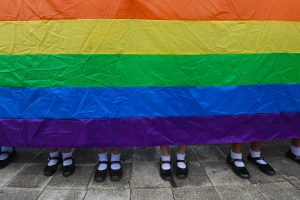LGBTQ students need inclusive sex ed – but less than 10% in US are receiving it, report says

Story Highlights
- Less than 8.2% of LGBTQ students are receiving inclusive sex education in school, according to a May report by several LGBTQ health and policy organizations.
- Only seven states and the District of Columbia require sex education to be LGBTQ+ inclusive, according to the report.
With more Americans than ever coming out as LGBTQ, the need for inclusive sex education is more pressing than ever – but few students are getting it, according to a report released ahead of Pride Month.
Less than 8.2% of LGBTQ students said they received inclusive sex education in school, a failure that could have lasting effects from adolescence into adulthood, according to “A Call to Action: LGBTQ Youth Need inclusive Sex Education,” published in May by several LGBTQ health and policy organizations.
“Far too many LGBTQ youth are attending schools that lack inclusive policies and sitting in classrooms where their teachers and textbooks significantly fail to address their identities, community, and experiences. Nowhere is this absence more clear, and potentially more damaging, than in sex education,” says the report, citing a number of other analyses.
Only a fraction of the 50 states – 18 – require sex education to be medically accurate, and just seven states and the District of Columbia require sex education to be LGBTQ+ inclusive, according to the report, an absence causing drastic consequences.
“We know non inclusive sex education can cause significant harm to young queer and trans folks, particularly LGBTQ youth of color,” said Preston Mitchum, policy director for Unite for Reproduction and Gender Equity, one of the report’s authors.
But the report says those students are “lacking information about themselves, and how sex and sexuality might be applicable to their own life experience,” said Joseph Kosciw, GLSEN research director.
“For any students seeing themselves included in the curriculum, they are more engaged in their education, and they thrive more, they’re more connected to school, and they often do better in school,” he said.
But “when you don’t see yourself being reflected in the education that you receive and in the information that you learn,” Mitchum said, that can cause negative mental and physical health outcomes.
Kids aren’t learning LGBTQ history. The Equality Act might change that.
Source: Read Full Article
